
Radiation Oncology
Scope & Guideline
Elevating oncology knowledge for better patient outcomes.
Introduction
Aims and Scopes
- Clinical Effectiveness and Outcomes Research:
The journal prioritizes studies that assess the effectiveness of various radiation therapy techniques, including comparisons of treatment modalities, patient outcomes, and quality of life metrics. - Technological Innovations in Radiation Therapy:
Research on emerging technologies, such as MRI-guided radiation therapy, proton therapy, and advanced imaging techniques, is a core focus area, facilitating improvements in treatment precision and patient safety. - Personalized and Adaptive Radiation Treatment Planning:
The journal emphasizes the development of personalized treatment plans and adaptive radiation therapy approaches that take into account individual patient characteristics and tumor biology. - Pediatric Radiation Oncology:
Recognizing the unique challenges in treating pediatric patients, the journal includes research focused on radiation therapy protocols, outcomes, and techniques tailored for children. - Integration of Systemic Therapies and Radiation:
Studies exploring the combination of radiation therapy with systemic therapies, such as immunotherapy and targeted therapies, are vital to understanding synergistic effects and improving patient outcomes. - Health Disparities and Access to Care:
The journal seeks to address healthcare disparities in radiation oncology, examining factors that affect access to treatment across diverse populations. - Quality Assurance and Safety in Radiation Therapy:
Research aimed at improving safety protocols, quality assurance measures, and risk management strategies in radiation therapy practices is a significant area of focus.
Trending and Emerging
- Artificial Intelligence and Machine Learning Applications:
There is a growing trend in the use of AI and machine learning to enhance radiation therapy planning, automate contouring, and predict patient outcomes, indicating a shift towards data-driven approaches in clinical practice. - Patient-Reported Outcomes and Quality of Life Assessments:
An increasing emphasis on patient-reported outcomes and quality of life studies reflects a broader trend in healthcare towards prioritizing patient experience and satisfaction in treatment evaluations. - Hypofractionated and Ultra-Hypofractionated Radiation Therapy:
The adoption of hypofractionated and ultra-hypofractionated treatment regimens is on the rise, driven by evidence suggesting comparable or improved outcomes with reduced treatment times. - Integration of Telehealth in Radiation Oncology:
The COVID-19 pandemic has accelerated the integration of telehealth practices in radiation oncology, with increasing research on virtual consultations and remote monitoring of patients. - Focus on Health Disparities and Access to Radiation Therapy:
Emerging themes include a focus on addressing disparities in cancer care, with research aimed at understanding and improving access to radiation therapy for underrepresented and disadvantaged populations. - Multidisciplinary Approaches to Cancer Treatment:
There is a notable trend towards interdisciplinary collaboration, with studies exploring the integration of radiation therapy with surgical, medical, and supportive care to optimize patient outcomes.
Declining or Waning
- Traditional Radiation Techniques:
There has been a noticeable decrease in studies focusing on conventional radiation techniques, such as 2D and 3D conformal radiation therapy, as the field increasingly shifts towards more advanced modalities like IMRT and proton therapy. - Basic Science and Preclinical Studies:
Research articles centered on basic science and preclinical findings related to radiation effects on cellular and molecular levels have become less frequent, with a greater focus now on clinical applications and patient-centered outcomes. - Radiation Therapy Alone Without Concurrent Treatments:
The frequency of studies examining radiation therapy in isolation, without concurrent systemic treatments or multimodal approaches, has declined, reflecting a trend towards integrated treatment strategies. - Historical Perspectives and Case Reports:
The publication of historical analyses and case reports has waned, as the journal increasingly prioritizes larger cohort studies and data-driven research that can provide robust evidence for clinical practices. - Generalized Population Studies:
Research focusing on generalized population trends in radiation therapy usage has decreased, as there is a growing emphasis on personalized medicine and targeted studies that address specific patient demographics or conditions.
Similar Journals
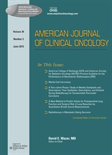
AMERICAN JOURNAL OF CLINICAL ONCOLOGY-CANCER CLINICAL TRIALS
Transforming Cancer Treatment with Cutting-Edge ResearchAMERICAN JOURNAL OF CLINICAL ONCOLOGY-CANCER CLINICAL TRIALS, published by Lippincott Williams & Wilkins, is a pivotal journal in the fields of oncology and cancer research, focusing on the latest advancements in clinical trials and therapeutic strategies for cancer management. With an ISSN of 0277-3732 and an E-ISSN of 1537-453X, this journal serves as an essential resource for the dissemination of high-quality research findings, scholarly reviews, and innovative methodologies, aiming to advance clinical oncology from 1982 to 2024. It is categorized in Q3 for Cancer Research and Q2 for Oncology, reflecting its significant role in the scientific community. In addition to its rigorous peer-reviewed content, the journal provides a platform for researchers and clinicians to share valuable insights, laying the groundwork for future breakthroughs in cancer treatment. Although it currently does not offer open-access options, the journal remains accessible to a wide audience through academic institutions and libraries. The AMERICAN JOURNAL OF CLINICAL ONCOLOGY is crucial for anyone involved in oncology research, making it a must-read for professionals dedicated to improving cancer care.

Translational Oncology
Pioneering the Next Generation of Cancer TreatmentsTranslational Oncology is a premier open access journal published by Elsevier Science Inc, dedicated to the rapidly evolving field of cancer research and oncology. Since its inception in 2008, the journal has been a vital platform for the dissemination of innovative research and findings that bridge the gap between laboratory discoveries and clinical applications. With an impressive impact factor and ranked Q2 in Cancer Research and Q1 in Oncology, it occupies a prominent position in the academic landscape, helping to shape the future of cancer therapeutics and patient care. The journal offers valuable insights across a diverse array of topics, including molecular biology, genetic factors in cancer, and innovative treatment strategies, ensuring relevance and engagement for its readership. As it converges toward 2024, Translational Oncology continues to attract a global audience of researchers, healthcare professionals, and students committed to advancing our understanding of cancer and enhancing clinical outcomes.
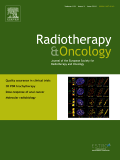
RADIOTHERAPY AND ONCOLOGY
Transforming cancer therapies with cutting-edge studies and reviews.Radiotherapy and Oncology is a leading peer-reviewed journal published by Elsevier Ireland Ltd, focusing on the vital fields of hematology, oncology, and radiology. With an impressive impact factor and ranking in the top quartiles (Q1) of its categories as of 2023, it is recognized for disseminating high-quality research that contributes significantly to advancements in cancer treatment and patient care. The journal, which has been in circulation since 1983, aims to provide a platform for original research articles, reviews, and clinical studies that explore the latest innovations in radiotherapeutic technologies and oncology practices. This journal is essential for researchers, healthcare professionals, and students who are dedicated to improving cancer therapies and outcomes. Although it does not offer open access, the wealth of information contained within its pages supports continued education and development in these crucial medical fields.

Physics & Imaging in Radiation Oncology
Pioneering Insights at the Intersection of Physics and OncologyPhysics & Imaging in Radiation Oncology is a premier journal dedicated to advancing the interdisciplinary field of radiation oncology through innovative research and imaging technologies. Published by Elsevier, this open-access journal has made its mark since its inception in 2017, ensuring that groundbreaking findings are accessible to a broad audience. With a strong focus on the integration of physics, imaging techniques, and oncology, the journal occupies esteemed positions in the academic landscape, ranking in the top quartile for Radiation and Radiology, Nuclear Medicine and Imaging as of 2023. The journal serves as a platform for researchers, professionals, and students to share insights and foster collaboration, ultimately improving patient outcomes through enhanced imaging and treatment modalities. Based in Ireland and operating from Radarweg 29, 1043 NX Amsterdam, Netherlands, the journal aims to bridge the gap between theoretical physics and practical applications in clinical settings.

Journal of Radiosurgery and SBRT
Transforming Patient Care through Cutting-edge TherapiesJournal of Radiosurgery and SBRT is a dedicated platform for advancing the field of radiosurgery and stereotactic body radiation therapy (SBRT), published by OLD CITY PUBLISHING INC. With its ISSN 2156-4639 and E-ISSN 2156-4647, this journal serves researchers and practitioners keen on the latest findings and methodologies in the domains of radiological technology and surgical oncology. Operating from Spain, the journal has established itself within notable quartiles, ranking Q3 in 2023 across categories including Radiological and Ultrasound Technology, Radiology, Nuclear Medicine and Imaging, and Surgery. The journal is indexed in Scopus, with rankings that place it at #311 in Medicine Surgery and #232 in Medicine Radiology categories, reflecting its significance in the academic community. Although it does not currently offer an open-access model, the Journal of Radiosurgery and SBRT aims to foster innovation and collaboration, making it an essential resource for those involved in cutting-edge research and clinical practice in radiosurgery.
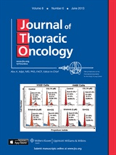
Journal of Thoracic Oncology
Pioneering Research for a Healthier TomorrowJournal of Thoracic Oncology, published by Elsevier Science Inc, is a premier scholarly outlet dedicated to advancing the field of thoracic oncology. With an impressive impact factor and consistently rated in the Q1 quartile across several pertinent categories such as Medicine, Oncology, and Pulmonary and Respiratory Medicine, this journal stands at the forefront of research dissemination. Covering a broad scope that includes innovative therapeutic approaches, clinical trials, and the molecular underpinnings of thoracic malignancies, the journal serves as a vital resource for researchers, healthcare professionals, and students seeking to enhance their understanding of thoracic cancer and its treatment. With publication dates converging from 2006 to 2024, the Journal of Thoracic Oncology fosters a collaborative scholarly community by providing a platform for high-quality research while ensuring accessibility through traditional publication formats. Positioned in the heart of New York City, this journal not only reflects the cutting-edge advancements in oncology but also plays a pivotal role in shaping the future of thoracic cancer care.

International Journal of Radiation Research
Elevating Standards in Radiological ScienceThe International Journal of Radiation Research, published by the IJRR-IRANIAN JOURNAL RADIATION RES, serves as a critical platform for researchers and professionals in the fields of radiology, nuclear medicine, and imaging technology. Since its inception in 2003, this peer-reviewed, open-access journal has focused on disseminating significant findings and advancements, contributing to the global discourse on radiation research. With an ISSN of 2322-3243, the journal offers valuable insights into emerging technologies and methodologies, maintaining a commitment to enhancing the understanding and application of radiation in medical science. Although currently positioned in the Q4 category across its scopes, the journal strives to elevate its impact by promoting high-quality research and innovative practices. The journal is accessible to a wide audience and encourages submissions from scholars worldwide, directly supporting the advancement of knowledge in radiological and ultrasound technology. For those seeking to explore and contribute to this dynamic field, the International Journal of Radiation Research represents an invaluable resource.
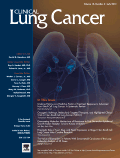
Clinical Lung Cancer
Advancing lung cancer research for a healthier tomorrow.Clinical Lung Cancer is a prestigious journal published by CIG MEDIA GROUP, LP, dedicated to advancing the field of oncology and pulmonary medicine since its establishment in 2000. With an impressive impact factor and high ranking within its fields—achieving Q1 status in Oncology and Pulmonary and Respiratory Medicine in 2023—this journal serves as a vital resource for researchers, clinicians, and students alike. Covering a wide scope of topics related to lung cancer, Clinical Lung Cancer offers a platform for innovative studies, clinical trials, and comprehensive reviews that contribute to both theory and practice. While it operates on a subscription basis, the quality of content is reflected in its ranked status within the top quartile of cancer research journals. This journal plays a critical role in shaping the future of lung cancer research and treatment, making it an essential destination for those looking to stay at the forefront of the field.

Radiological Physics and Technology
Bridging disciplines for a healthier tomorrow.Radiological Physics and Technology, published by SPRINGER JAPAN KK, is a prominent journal that serves as a crucial resource in the multidisciplinary fields of medicine and radiation sciences. With an ISSN of 1865-0333 and an E-ISSN of 1865-0341, the journal has been converging impactful research from 2008 to 2024. It holds a commendable position in academic rankings, currently classified in Q2 in Physical Therapy, Sports Therapy and Rehabilitation and Radiation, along with Q3 for Medicine (miscellaneous) and Radiology, Nuclear Medicine and Imaging. The journal is well-regarded in the academic community, reflected in its Scopus rankings that place it in the upper tiers of its respective categories. Although it currently does not offer Open Access, Radiological Physics and Technology remains a pivotal publication for researchers, academics, and practitioners seeking to advance knowledge and foster innovation in radiological science. Its commitment to disseminating high-quality research ensures its continued relevance and importance within these fields.
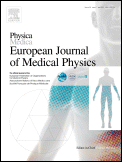
Physica Medica-European Journal of Medical Physics
Pioneering Insights in Medical Physics ExcellencePhysica Medica - European Journal of Medical Physics is a premier peer-reviewed journal published by ELSEVIER SCI LTD, dedicated to advancing the field of medical physics. Established in 1989 and serving as a critical platform for innovative research, this journal covers a broad spectrum of topics within biophysics, radiology, and imaging sciences, consistently ranked in the Q1 category across these disciplines. With an impressive impact factor that highlights its influence within the scientific community—ranking 52/333 in Radiology, 42/243 in Physics and Astronomy, and 35/152 in Biochemistry—the journal is a valuable resource for professionals, researchers, and students aiming to contribute to the technological and methodological advancements in medical physics. Physica Medica is committed to fostering open dialogue and collaboration within the global medical physics community, although it currently does not offer open access options. The journal's extensive citation history and ongoing relevance underscore its importance in the continuous evolution of medical science.